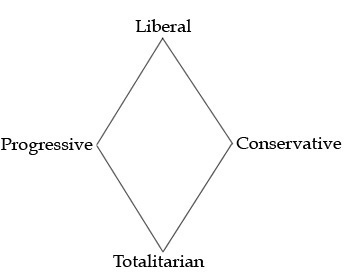Know Your Useless Political Labels: Conservative Is Not Opposite Liberal -- That Would Be Totalitarianism
It's always bothered me when people mis-used political labels, perhaps precisely because labels prevent or at least hinder discourse, and therefore action. Under the true definition almost everyone is a liberal. You're either a liberal progressive or a liberal conservative depending whether you look to older or newer solutions to problems.
Seriously, doesn't that sound just a little bit ridiculous. Who can say whether they always choose solutions that have been tried or are brand new. It's a stupid distinction and definition. We should be defined as small government liberals and big government liberals, and leave progressive and conservative out of the show.
---
When I tell people that there's a symbiotic relationship between science and liberalism, it turns out that what I usually need to define is not "symbiotic," which most folks understand to mean mutually beneficial, but "science" and "liberalism."
The word science is used today to describe the work of the thousands of researchers who conduct or monitor experiments, interact in scientific organizations, and publish in refereed journals. They belong to the world's only genuinely international community, and their findings are applicable from here to the far reaches of the universe.
Prior to the rise of science, some four centuries ago, ideas were evaluated by checking them against logic and everyday experience to see whether they "seemed good"--which is the etymological root of the word "dogma." Science created a new approach, in which ideas are tested experimentally. Those that fail such tests are either discarded or modified. Those that succeed are accepted, but only provisionally--which is why scientists still speak, say, of the "theory" of evolution, although the basic mechanisms of biological evolution are as well understood as is the physics behind microprocessors and nuclear power plants. Keeping the feedback loops humming requires free, constant, and often contentious communication between scientists all over the world. That's where liberalism comes in.
By liberalism I mean the original political philosophy called by that name--the one espoused by John Locke and embodied in the Bill of Rights. Liberalism is based on the hypothesis that people ought to be maximally free, with the government intervening only to the extent required to protect their freedoms against abridgment by their compatriots or by enemies abroad. This was a radical idea in the eighteenth century, when few people had much education and the general public was routinely slandered as ignorant and untrustworthy. Locke himself feared that the public was so mired in "passion and superstition" as to be apt, as Voltaire put it, to act irrationally and "speak without thinking." Sharing such qualms, many of the American founders described the newborn United States as akin to a scientific experiment. "No experiment can be more interesting than that we are now trying," wrote Thomas Jefferson in 1804, "and which we trust will end in establishing the fact, that man may be governed by reason and truth."
Liberal democracy--the form of government in which a majority can elect leaders but not constrain human rights--has survived innumerable social experiments to become the choice of more than a third of all humanity and the stated preference of most of the remainder. (Even outright despots feel obliged to pay lip service to its inevitability, if only as a distant prospect to be realized once the populace is "ready.") Yet in the United States--and, increasingly, in parts of Europe as well--the term liberal has come to mean the political Left. This has served only to cloudy the political waters. Those on the Left are free to call themselves anything they like--such as progressive, a term many have been taking up lately--but they ought not to be called liberals. Liberalism is an independent political philosophy, with no inherent connection to either the Left or the Right.
---


 Feb 18, 2010 at 2:54 PM
Feb 18, 2010 at 2:54 PM